#austrian history
Text







Women in History Month (insp) | Week 3: Consorts and concubines
#historyedit#perioddramaedit#women in history#women in history month challenge#my edits#mine#isabella of parma#imperial noble consort dunsu#eleanor of toledo#ines de castro#mme du barry#eugenie of montijo#empress fu shou#austrian history#chinese history#italian history#french history#portugese history#18th century#15th century#3rd century#14th century#19th century
109 notes
·
View notes
Text
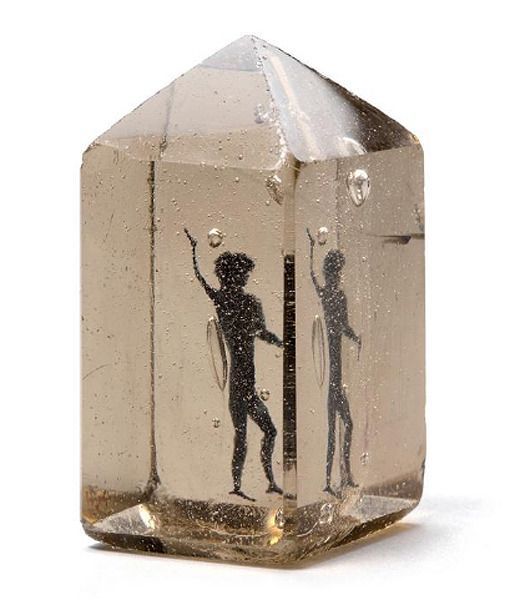
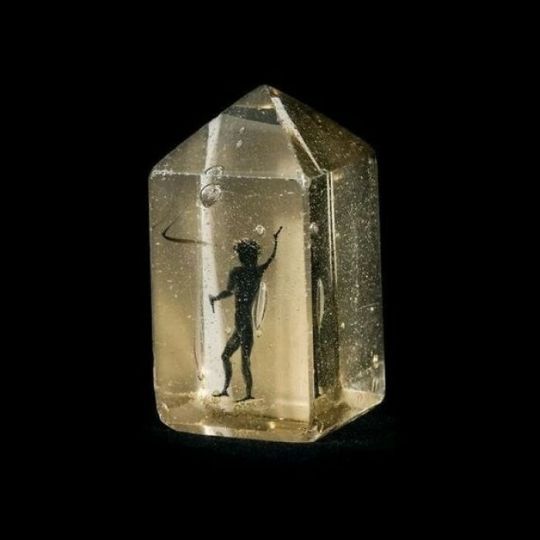
"Devil in the glass" a chunk of glass for which people in the 18th century believed that they captured the devil
#goth#aesthetic#gothic#mine#edgy#history#vintage#dark photography#photography#antiques#antique#art#devil#satanist#satanism#glass art#austria#austrian#austrian history#the devil#18th century#germany
1K notes
·
View notes
Text
by far the most disgusting thing ive ever seen was when i visited concentration camp mauthausen recently and as we were passing st georgen/gusen, a village in which there were several particularly brutal subdivisions of the camp and which is now full of memorials, by bus i spotted a tattoo parlor whose sign was sprinkled with nazi dogwhistles. i was shocked to see it literally 2 minutes away from the gusen memorial but unfortunately not surprised. austria, especially upper austria, still has a huge neonazi problem.
these people are especially vicious because theres no fucking way they are holocaust denying nazis if they live surrounded by the ruins of multiple camps; these fuckers are most likely just celebrating it. and heres where i have to clarify: austria has had a long history of justification and passing of blame. they used to pass the blame onto the germans, said "we were their first victims because we were annexed"; the prisoners of mauthausen were literally spit on by the inhabitants of the town as they were passing through from the train station to the camp who then pretended they didnt know about anything that was going on.
im also going to be brutally honest here: my great aunt, for example, was ideologically a nazi. if you are austrian or german, chances are some, or even, terrifyingly, most of your ancestors were. and some of these "ex nazis" still live within our society and received no consequences for the utterly atrocious shit they used to partake in or passively allowed to happen.
visiting mauthausen i really expected i would be sad and cry my eyes out during my entire stay but the most intense emotion i felt that day was rage. im not a violent person but i wish nazis nothing but a long, excruciating stay in hell. i want each and everyone who breathes today and still glorifies, denies or justifies these atrocities to perish, and suffer until their last heartbeat. they deserve nothing less. there is no middle ground, no tolerance, no empathy. they are the scum of the earth and should be treated as such.
please visit a concentration camp if you can. its an obviously awful, but still important sight that everyone needs to be confronted with.
#said it before and ill say it forever#fck nzs#socialist#leftist#social justice#antifascism#antisemitism#austrian history
76 notes
·
View notes
Text
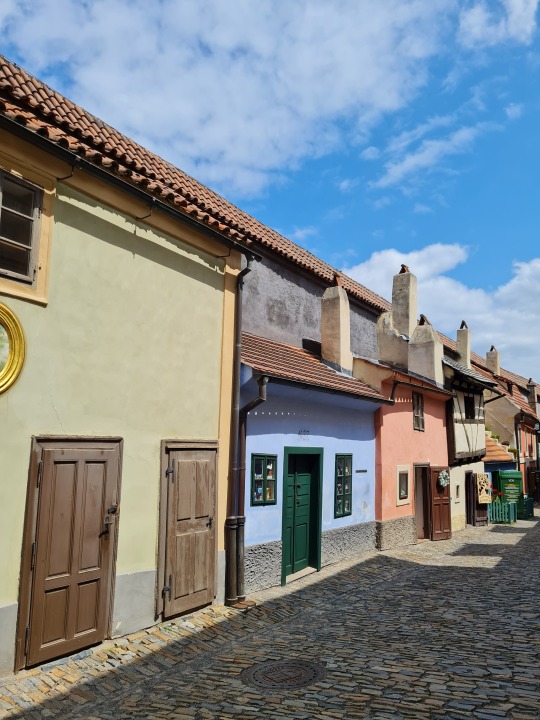

Number 22 of the Golden Lane in Prague is the number of the house where Franz Kafka lived and wrote for about a year, between 1916 and 1917.
Now, it is a small museum and a bookstore.
#prague#praha#czech republic#franz kafka#the metamorphosis#kafka#austria hungary#the trial#the castle#german writer#austrian history#jewish#jewish people#jewish culture#jewish writer#writers and poets#czechia#czech#czech stuff#german#20th century#literature#german literature#modernism#prague castle#prague czech republic#praha1#prahacity#modernist literature#history
207 notes
·
View notes
Text

Empress Elisabeth "Sissi" of Austria-Hungary
53 notes
·
View notes
Text

Thought I'd do a thing for @best-habsburg-monarch since they'd just finished their polls and someone i rooted for on my own always nonsense reasons actually clawed his way into the top three
#my art#history art#Habsburg history#House of habsburg#maria theresa#Maria theresia#Maximilian i of mexico#Rudolf ii#Rudolph ii#17th century#18th century#19th century#austrian history#Anyway. I love you rudolf 💖💜💙#Pleasure doing business with you all if it meant one funny freak could make it this far#Doesn't matter all my other lads lost rip ferdinand rip charlie quint rip leopold rip carlos rip franz rip felipe my in law
19 notes
·
View notes
Text
The Napoleon Movie
So I know that I am SUPER late to the party (I'm sorry y'all I haven't logged into this account since july 😭), but I wanna give my opinion on the Napoleon movie.
It's negative, obviously. But since I've already seen a lot of people say what I wanted to already, I'll say some things that I haven't seen anyone comment on:
When I was scrolling on TikTok, I saw someone say how the Napoleon movie was meant to show the more human side of Napoleon. Fair enough. But the movie didn't do that and it was marketed as an action movie. If they really wanted to showcase Napoleon's human side, why didn't they showcase his youth (he was bullied and correct me if I'm wrong I got this from Andrew Roberts book, even suicidal at one point in his life. He wrote a self insert book about a failed relationship...). Or why didn't they even mention The Napoleonic Code? That code is literally the basic law structure across the world yet you didn't even bother to mention it? It's the literal key to Napoleon's views and the man himself.
Good thing about the movie: Napoleon II appeared!!!
#napoleon bonaparte#napoleon#napoleonic era#french history#l'aiglon#napoleon ii#austrian history#culture#movies#napoleon 2023#france#ramblings
15 notes
·
View notes
Text
And this, friends, is why graphic design matters:
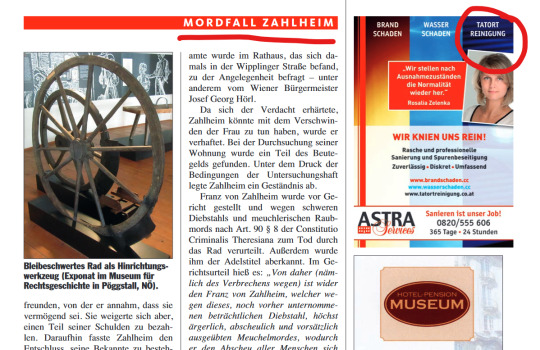
This is an excerpt from a two-page article published in the Magazin Öffentliche Sicherheit 11-12 2012, the official publication of the Federal Austrian Ministry of the Interior, about a famous 18th century Viennese murder trial.
The latter was quite extraordinary in so far as that both the method of the execution, which (luckily!) would become known as the last of its kind in Austria, and the delinquent were unusual; on 29 January 1786, Franz von Zahlheim, a scion of a noble family and a civil servant, murdered a female acquaintance who had come to his home accusing him of having robbed her the day prior when he had visited her in her home. Zahlheim, notoriously short of money, had indeed stolen from her, and killed his victim in order to cover up the theft. Zahlheim's attic was swiftly identified as the crime scene, and Zahlheim as the culprit.
The death sentence, as Zahlheim received, was rarely acted upon during the rule of Josef II, and particularly not by being broken by the wheel, causing the Zahlheim-case to stand out.
I am still on the fence whether I want to believe that the person responsible for the maagazine's layout did not read the article while adding the advertisements, or whether someone with a macabre sense of humour got a laugh out of purposefully arranging the ads thus, but next to the image of the article, which describes both the crime scene at Zahlheim's house and his (horrific, and rather messy as well) mode of execution is an advertisement for a cleaning business.
In the red box, the firm assures potentially interested customers that We restore normalcy after a state of emergency, and above, lists what special situations they're equipped to deal with: fire damage. Water damage. And, cleaning up crime scenes.

Part of the article, featuring an anonymous engraving of a contemporary artist imagining the murder based on information from the trial.

...If he had contracted this firm, Franz von Zahlheim's attic would have been squeaky clean, never been identified as the crime scene, and he would have escaped execution...
Could you advertise a modern cleaning business any more effectively?
#history humour#graphic design is my passion#franz von zahlheim#vienna#austria#18th century#history#austrian history#cw murder#cw execution#cw violence
17 notes
·
View notes
Text
Gašper Levičnik/Caspar Levitschnigg (1772–1825)
Baptized on January 6, 1772 in Eisnern (now Železniki) in the Duchy of Carniola (modern-day Slovenia), then part of the Hasburg Monarchy.
Studied at the Jesuit gymnasium in Laibach (now Ljubljana, Slovenia), then the St. Anna gymnasium in Vienna. Studied law at the University of Vienna, graduated a Doctor of Law in 1798. Taught canon law at the same university in 1799 and 1800.
Had his own law practice from 1801. Married Catharina Lessacher, the daughter of a professor at the St. Anna gymnasium, that same year. Purchased three lordships in Lower Austria (Oberstinkenbrunn in 1807, Königsstetten in 1814, Stollberg in 1817).
Nobilitated in 1815 for "service to the state and noble handling of his subjects", elevated a Ritter in 1818 with the predicate von Glomberg.
Died on January 20, 1825 in Vienna.
Fig 1 (coat of arms as Edler):

Fig 2 (coat of arms as Ritter):
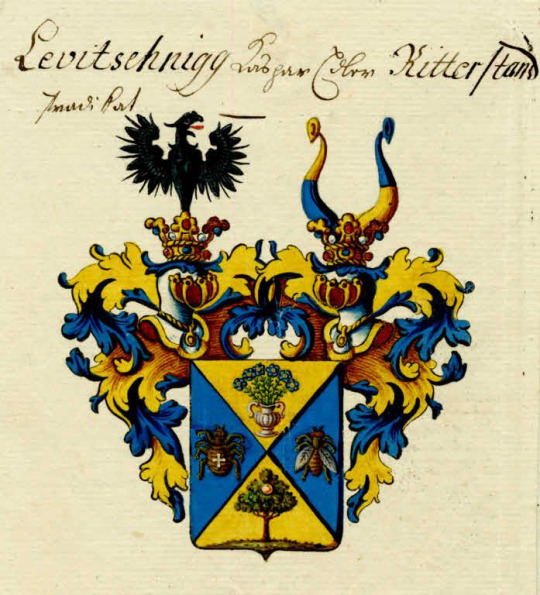
#18th century#19th century#1700s#1800s#Slovenia#Vienna#Wien#Slovenija#Habsburg Monarchy#Austrian Empire#Österreich#Austria#history#biography#important-people#Slovenian history#Austrian history#Central Europe#Central European history
10 notes
·
View notes
Photo
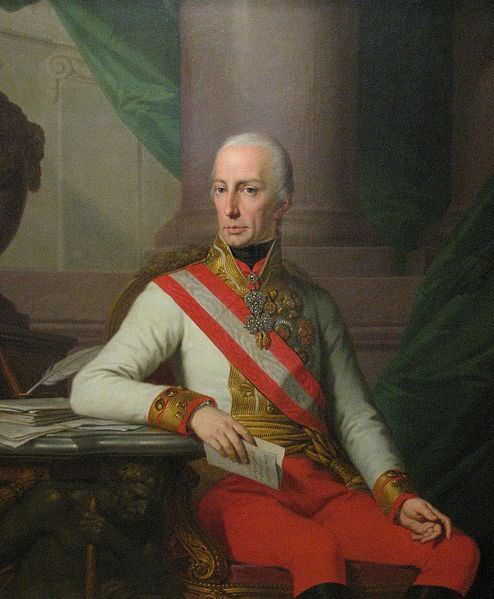
Francis I of Austria (Francis II, Holy Roman Emperor) was born on 12 February 1768 in Florence. Francis was the eldest son of Leopold, Grand Duke of Tuscany and future Holy Roman Emperor, and Archduchess Maria Louisa of Spain. Marie Antoinette was his father’s younger sister.
Francis inherited the imperial throne on March 1, 1792, at the age of 24. As a monarch, he was an unwavering absolutist. He feared calls for liberty and equality, and strongly opposed the influence of revolutionary thought in Austria. European liberals deemed him a tyrant.
Francis’s son-in-law, Napoleon, called him "a good and religious man, but a blockhead occupied only with botany and gardening." Clemens von Metternich wrote of Francis’s “immovable strength of character.”
Francis died on 2 March 1835 of a sudden fever. He was 67 years old. His tomb is in the Habsburg Imperial Crypt in Vienna.
For more about his life, including why he married his daughter (Archduchess Marie Louise) off to Napoleon, see “Francis I of Austria, Napoleon’s Father-in-Law.”
#francis i#napoleon#marie louise#napoleonic#austria#austrian history#holy roman emperor#holy roman empire
35 notes
·
View notes
Text
MARIA THERESA VON PARADIS // MUSICIAN
“She was an Austrian musician, teacher and composer who lost her sight at an early age. By sixteen, she was performing as a singer and pianist, having learned over sixty concertos by heart. She toured Europe, receiving great reviews. In 1785, she helped to establish the Institution Nationale des Jeunes Aveugles in Paris, the first school for the blind.”

2 notes
·
View notes
Text

She's everything. He's just Ken.
#Maria theresa#Francis I#Empress maria theresa#18th century#barbie movie#Barbie meme#house of habsburg#austrian history#history shitposting#Ive finally done it suzanne if finally done it
18 notes
·
View notes
Text
Day 8: Anne of Bohemia and Hungary
Anne of Bohemia and Hungary (also known as Anna Jagellonica)
Born: 23 July 1503
Died: 27 January 1547
Parents: Vladislaus II of Hungary and Anne of Foix-Candale
Archduchess Consort of Austria, Queen Consort of Hungary, Bohemia and Croatia
Children:
Elizabeth, Queen of Poland
Maximilian II, Holy Roman Emperor
Anna, Duchess of Bavaria
Ferdinand II, Archduke of Austria
Maria, Duchess of Jülich-Cleves-Berg
Archduchess Magdalena
Catherine, Queen of Poland
Eleanor, Duchess of Mantua
Archduchess Margaret
Barbara, Duchess of Ferrara
Charles II, Archduke of Austria
Archduchess Helena
Joanna, Grand Duchess of Tuscany
Anna of Bohemia and Hungary was the oldest child and only daughter of Vladislaus II of Hungary and his third wife Anne of Foix-Candale. Her younger brother was the King of Hungary, Croatia and Bohemia. On her father’s side, her grandparents were Casimir IV of Poland and Elisabeth of Austria. On her mother’s side her grandparents were Gaston de Foix, Count of Candale, and Catherine de Foix.
She was born in Buda (actualmente Budapest)
Her mother died shortly after her brother’s birth.
Their father died on 13 March 1516 and the two siblings were left in the care of the Holy Roman Emperor Maximilian I.
Maximilian arranged for Anne to marry his grandson, Archduke Ferdinand of Austria.
Anne received a humanist education focused on problem-solving skills. There was also an emphasis on self-defense with weapons and other physical skills and hunting. She was instructed in music and dance and came into contact with many humanists visiting the imperial library.
On 26 May 1521 in Linz, Austria, Anne and Ferdinand were married. Ferdinand governed Habsburg hereditary lands on behalf of his older brother Charles V, Holy Roman Emperor.
It was stipulated that if Anne’s brother died without heirs, Ferdinand would succeed him.
On 29 August 1526, Louis was thrown off his horse at the Battle of Mohács against Suleiman the Magnificent. As he had no legitimate heir the thrones of Hungary and Bohemia were left vacant. Ferdinand quickly claimed them. He was elected king with Anne as his queen on 24 October 1526.
Hungary, on the other hand, was a different matter. Ferdinand was proclaimed king by a small group of nobles, but another group did not want a foreign ruler so they elected John Zápolya as an alternative king. The conflict that resulted lasted until 1570 when the Treaty of Speyer was signed in favor of Anne’s son Maximilian.
In 1531, Ferdinand’s brother Charles V elected him as his successor and was to be proclaimed King of the Romans after his death.
Anne was trusted by her husband, serving as regent in his absence and presiding over matters of great importance. She became renowned for her charity and wisdom.
All 15 of their children were born in Bohemia or Austria.
She died on 27 January 1547, aged 43, in Prague, after the birth of her last daughter.
#1500s#16th century#house of habsburg#women history#history#women in history#reinessance#hungary#austrian history
2 notes
·
View notes
Photo

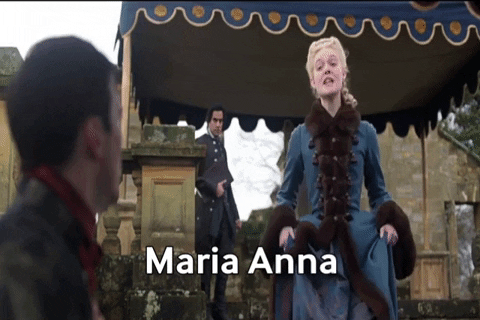


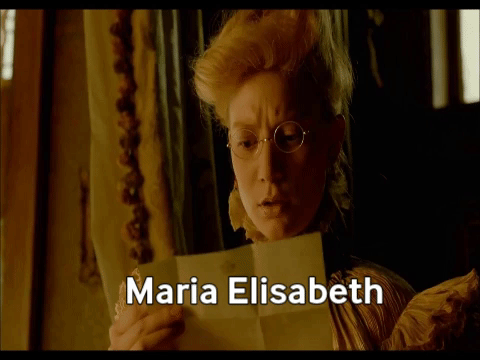

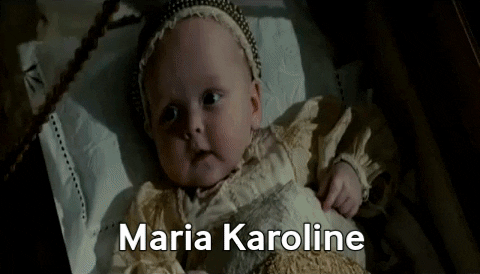



Daughters of Maria Theresa
Maria Theresa was a strict mother, and her offspring in the imperial nursery were certainly not spoiled. Isabella of Parma credited her mother-in-law with loving her children, but (…) ‘her love is never free of mistrust and a noticeable coolness (…) As far as her children are concerned, the Empress does indeed love them, but she proceeds from a false precept, which consists in a strictness of all too great severity’.
#historicwomendaily#maria theresa of austria#house of hasburg#marie antoniette#european history#Austrian history#maria elisabeth#maria anna#maria karolina#maria christina of austria#maria elisabeth of austria#maria amalie of austria#maria josepha of austria#myedit#my gif edit#mystuff#chibi makes things
74 notes
·
View notes
Text
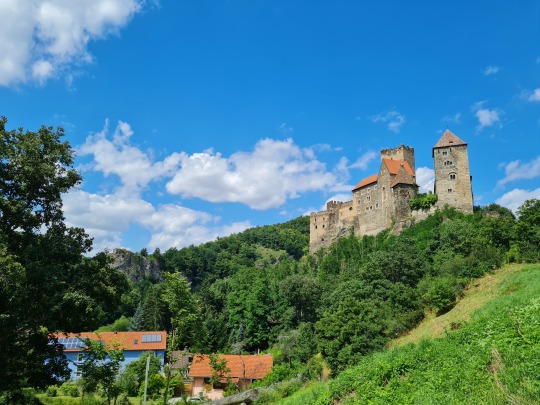
The view from the town of Hardegg over its castle, in Lower Austria
The castle was at least built before 1145. It was probably used as a border fortification, to protect this side of the river Dyje against the Moravians.
#austria#lower austria#moravia#dyje#thyria#castle#castles#schloss#12th century#medieval#medieval architecture#architecture#medieval castle#austrian history#travel#photography#travel photography#travelling#destination#landscape#history#nature#nature photography#hillside#hill castle#travel europe#culture#nobility#historical#middle ages
7 notes
·
View notes
Text
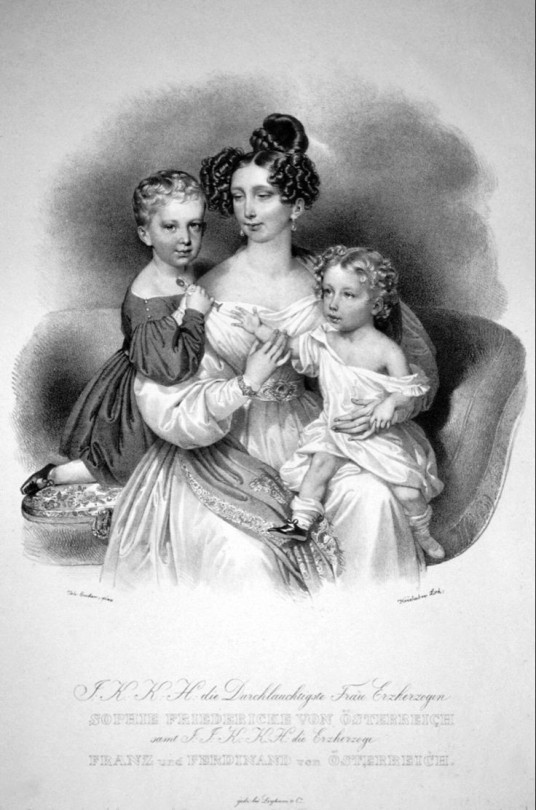
Archduchess Sophie of Austria with her two eldest children, Archduke Franz Joseph (future Emperor of Austria) and Archduke Ferdinand Maximilian (future Emperor of Mexico)
#archduchess sophie of austria#emperor franz joseph#emperor maximiliano of mexico#austrian imperial family#mexican imperial family#austrian history#mexican history#house of habsburg
13 notes
·
View notes